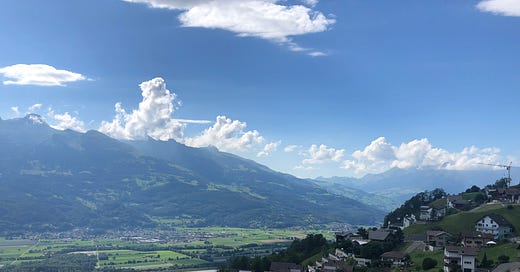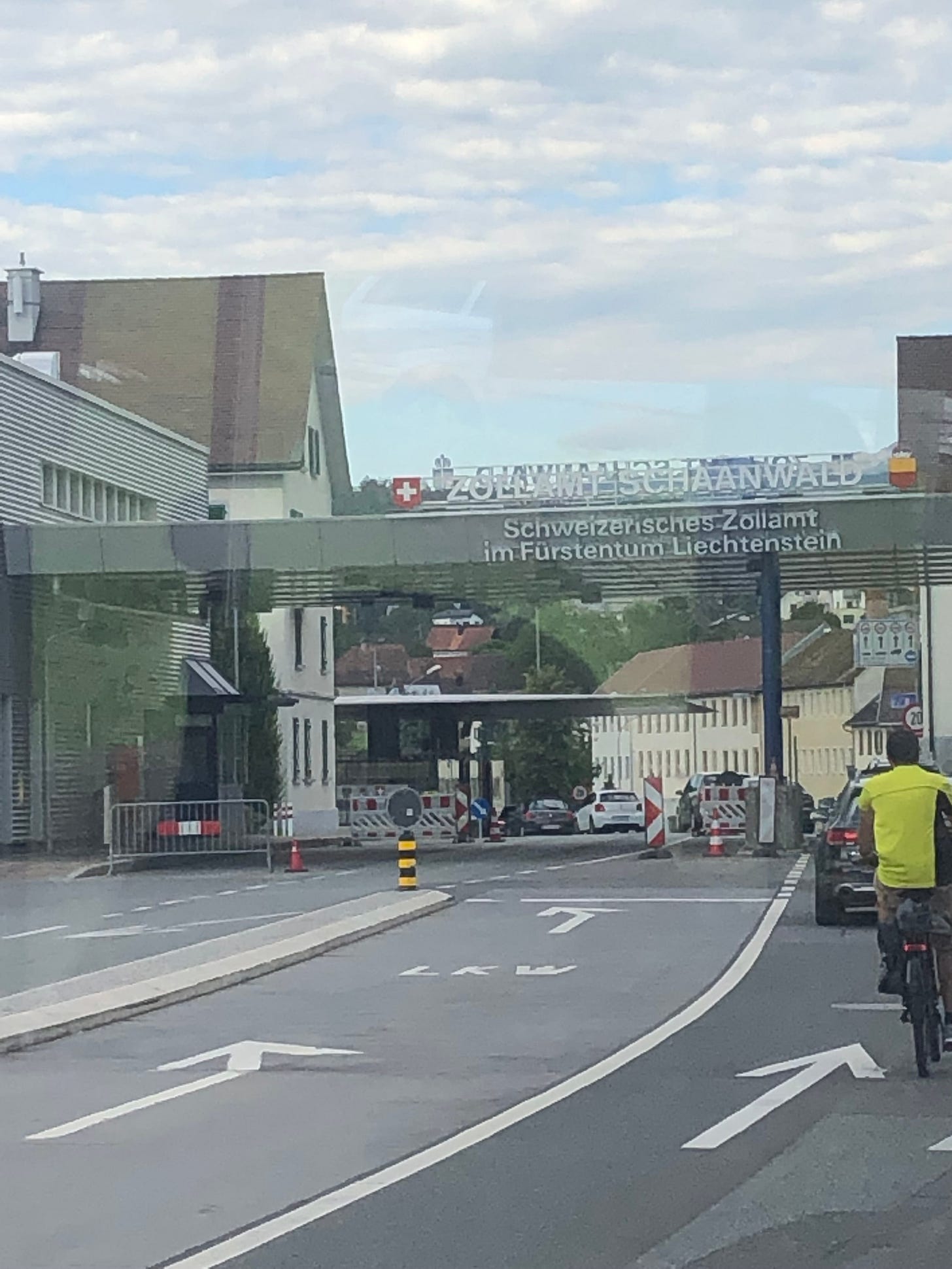A (little) essay about Liechtenstein
Liechtenstein is a tiny scrap of Alpine territory wedged between Austria and Switzerland. It is one of only two countries in the world which is double-landlocked – neither of its neighbours has a sea coastline.[1] It has 37,810 inhabitants – about the same as Bromsgrove, and considerably less than 10 per cent of Luxembourg – of whom 25,015 are Liechtenstein citizens and the other third are foreign. It measures 160km in land area (rather more if it were ironed out, as most of the country is mountainous), similar to Washington DC or the Wirral. Most of its people live on its western edge, along the Rhine valley border with Switzerland, where you will find its largest town, Schaan (5,992 people),[2] and its capital Vaduz (5,407). Its GDP per capita is the highest in the world (US$139,100). It is to Switzerland what Switzerland is to the EU.
Rhine valley view from Triesenberg, Liechtenstein – Switzerland starts at the river (LSB July 2019)
Everywhere in Liechtenstein is therefore border territory, and like some other micro-states and jurisdictional anomalies such as Monaco, Jersey and even Luxembourg it has a strong whiff of ‘offshore’ and a deep relationship with the global ultra-rich that transcends national borders. It is also a tourist destination of a peculiar self-referential sort. There are a few low-intensity attractions in the country, mostly in Vaduz, and skiing in season, but there are fewer old buildings and traditions there than I expected. The main draw is Liechtenstein’s quirky status as an independent micro-state. You go to Liechtenstein simply to be able to say, to yourself or by postcard or over social media, ‘I’m in Liechtenstein.’ The main souvenir you take away is being able to say, ‘I’ve been to Liechtenstein’. The friendly and efficient staff at the tourist office will, for a small fee, stamp your passport to prove it. If you are of that box-ticking, collecting mind, you will feel a sense of satisfaction at having another country filled in as terra cognita on your mental map of the world.
Liechtenstein is a proper, recognised independent country, a member of the United Nations since 1990 (12 years before Switzerland) and the Council of Europe since 1978. But it does not have some of the accoutrements of sovereignty. It does not have a currency of its own, and has not produced its own currency except during an anomalous period in 1918-20. It then piggy-backed on the Swiss franc, without the official permission of the Swiss, and a monetary treaty was only finally signed in 1980. It is part of a customs union with Switzerland, and permits Swiss border officials to operate on its territory.
Swiss customs checks on the border of Liechtenstein and Austria
Before its current association with Switzerland, it looked to Vienna and was in the orbit of the Habsburg empire. The military was dissolved in 1868 although there is still a clause in the constitution about compulsory military service. To this day, there are more military threats to Liechtenstein than one might imagine. It has been invaded, apparently by accident, on repeated occasions during manoeuvres of the Swiss Army over the last few decades. The Swiss accidentally started a forest fire on one inadvertent invasion, which was as bad as the damage has been, and the Liechtensteiners seem relaxed. After one incident in 2007, the interior ministry spokesman Markus Amman said that nobody had noticed and ‘it’s not like they stormed over here with attack helicopters or anything. No problem, these things happen.’[3]
Liechtenstein is mostly significant in international finance, but it does have some unusual manufacturing industry as well; the country is one of the world’s major producers both of false teeth and sausage casings. Some people commute in from Switzerland and Austria. Its extensive local bus system therefore serves three countries, an unusual distinction. There is no airport (but there is a heliport), and Austrian-operated local trains serve four Liechtenstein stations on their way between Feldkirch and Buchs in Switzerland, at either of which one can pick up main line trains.
As with most micro-states, Liechtenstein’s survival in the face of the larger forces of nationalism and empire was a matter of happenstance. The current borders of the state were established when the territories – then two even smaller entities, the Lordship of Schellenberg and the County of Vaduz - were sold by the rulers of Hohenems, who needed to raise money; it was not the first time that Liechtenstein had been cashed in to save its rulers from financial embarrassment. The reputation of the Hohenems dynasty is oddly different in the telling a few miles up and down the Rhine. In Liechtenstein’s history they are tyrannical, incompetent religious fanatics who were enthusiastic witch-burners. In Hohenems itself, they seem the good guys because they were relatively liberal about allowing Jews to live in their territory. Schellenberg and Vaduz were both bought by the Liechtenstein family, nouveau-riche Habsburg aristocrats a who wanted a vote in the complex structures of the Holy Roman Empire. After getting the Emperor’s permission to merge the duchies in 1719, the Liechtensteins named the new country after themselves, in the central European aristocratic equivalent of putting vanity plates on a used car.
Liechtenstein’s status as a tiny independent principality was not unusual at the time. It was one of many hundreds of statelets that were part of the Holy Roman Empire, and maintained its independence after 1815 as one of the member states of the German Confederation. The 1866 conflict between Austria and Prussia over the leadership of the German world marked the last involvement of Liechtenstein’s armed forces in a war. They were mobilised to assist the Austrians in their struggle with Prussia for leadership of the German world. The full armed strength of Liechtenstein, 80 men, arrived in the battlefield area of the south Tyrol after a ceasefire had already been agreed and they were assigned to a bit of guard duty. When they came home their number had increased to 81 – one of the Liechtenstein soldiers needed some help back on his farm, and a man they had met (a Tyrolean or an Italian depending on which version of the story you hear) accepted the job offer.
Stories like this make one want to like Liechtenstein and regard it as quirky and harmless, but it is a temptation that should be resisted. There is a dark side even to little Liechtenstein. The monarchy here is powerful, politicised and plutocratic. The Prince exercises powers of veto and executive control like no other European monarch, and campaigned successfully in 2003 to extend his powers against the elected parliament. In 2011 he promised to veto the legalisation of abortion even if people voted in favour in a referendum; a very moderate measure failed by a 52-48 margin and his threat itself almost certainly swung enough votes to make the difference. In such a small and socially conservative[4] country, ostracism and recrimination are powerful means of ensuring conformity and they are used at all levels. The Prince has often threatened to leave the country if his will was not done, a significant threat given that his enormous personal wealth and the even bigger hedge fund managed by the royal family are so important to the economy. Life is uncomfortable for the minority of Liechtensteiners who dislike this state of affairs or want a more normal democratic system.[5]
Although there is a close identification between the country and the royal family, this is recent, not an archaic survival. The Liechtensteins did not even live in their country until 1938, when they moved from Vienna to the castle set on the mountainside above Vaduz. It was not their main estate until 1945, when their vast landholdings in Moravia and Bohemia were nationalised by the Czechoslovak state when the family were expropriated as Germans. Despite having generated a fortune on the financial markets, the family took some time to let go and it was not until 2009 that Liechtenstein opened diplomatic relations with Czechia or Slovakia.
The Liechtensteins are a modern-day throwback to the Bourbons, in the sense of l’état, c’est moi and in their inability to forget. But in contrast to the Bourbons they have learned a lot. Behind the Ruritanian charm of Liechtenstein there is a highly efficient cog in the global financial system. Tax shelters and the secretive, flexible incorporated Anstalt – and the updated version, the foundation - that exist under Liechtenstein law are designed for the family fortune but are useful for other people who have a lot of money and are reluctant for various authorities to get to know too much about it. In the late 2000s Liechtenstein grudgingly responded to pressure from other European states, particularly Germany, to lift the curtain a little given the corporate governance failures and tax evasion it had enabled, but to the Prince there is no such thing as market failure, only state regulatory failure.
Liechtenstein isn’t a joke. The country’s role in global finance, and the CHF200bn (about £170bn) under management by the prince’s family firm (and the personal fortune of around USD$1.1bn) make it a more significant player than many larger and apparently more ‘real’ places.
The ultra-rich seem increasingly interested in designing their own libertarian free-market paradises, but Hans Adam was well head of the curve in making it reality. The Prince has written an interesting work of political theory based on Liechtenstein as a model, and its prescriptions are pretty much what you would expect from an intelligent, educated autocratic billionaire from the world of hedge funds or Silicon Valley.[6] Hans Adam is an ultra-free marketeer, regarding the work of the central state as justice and foreign policy (areas which the monarchy has a strong role in Liechtenstein) and wanting social provision pushed down to very local units. A hereditary pedigree does not mean that everything is tasteful in Liechtenstein; amid the royal plushness there is a tacky, money-first sensibility, not far from the aesthetic of a Trump hotel. For a few years in the early 2010s it was possible to rent the country and its seals of office for the day.
Liechtenstein may be anomalous in all sorts of ways, but there is something unsettlingly modern about its populist, aristocratic, wealthy chief executive who appeals to direct democracy and social conservatism against parliament. Liechtenstein might just be unusual in having arrived at its feudal-corporate-plutocratic-populist-nostalgic synthesis before the rest of the world.
[1] The other is Uzbekistan.
[2] Liechtenstein in figures, 2018 published by the Office of Statistics, Principality of Liechtenstein. https://www.llv.li/files/as/liechtenstein-in-figures-2018.pdf
[3] Coverage from https://www.theguardian.com/world/2007/mar/02/markoliver and https://www.news.com.au/travel/world-travel/europe/liechtenstein-the-country-thats-so-small-it-keeps-being-invaded-by-its-bigger-neighbour/news-story/08eee6f0d3dab6467c8c1dd8566c2514
[4] The (male) electorate only consented to the enfranchisement of women in a referendum in July 1984 by the narrow margin of 51-49 per cent, or a majority of 119 votes. However, the age of consent for same-sex relationships was equalised in the same year in Liechtenstein that it was in the UK – 2001.
[5] Wouter Veenendaal ‘The curious case of Liechtenstein’ https://blogs.lse.ac.uk/europpblog/2017/01/30/the-curious-case-of-liechtenstein/
[6] Prince Hans Adam II The State in the Third Millennium, I.B. Tauris, 2009.





